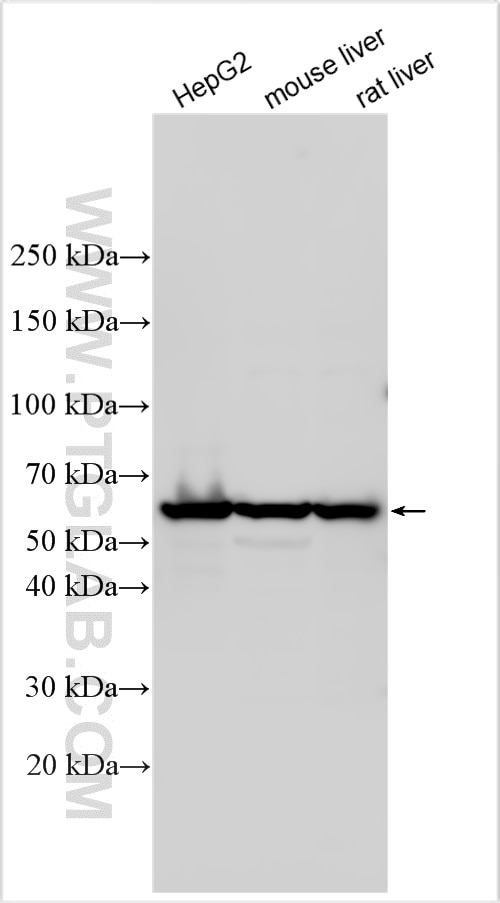Tested Applications
| Positive WB detected in | HepG2 cells, mouse liver tissue, rat liver tissue |
Recommended dilution
| Application | Dilution |
|---|---|
| Western Blot (WB) | WB : 1:1000-1:8000 |
| It is recommended that this reagent should be titrated in each testing system to obtain optimal results. | |
| Sample-dependent, Check data in validation data gallery. | |
Product Information
32379-1-AP targets CFHR5 in WB, ELISA applications and shows reactivity with human samples.
| Tested Reactivity | human |
| Host / Isotype | Rabbit / IgG |
| Class | Polyclonal |
| Type | Antibody |
| Immunogen | CFHR5 fusion protein Ag37714 Predict reactive species |
| Full Name | complement factor H-related 5 |
| Calculated Molecular Weight | 569 aa, 64 kDa |
| Observed Molecular Weight | 60 kDa |
| GenBank Accession Number | BC111773 |
| Gene Symbol | CFHR5 |
| Gene ID (NCBI) | 81494 |
| Conjugate | Unconjugated |
| Form | Liquid |
| Purification Method | Antigen affinity Purification |
| UNIPROT ID | Q9BXR6 |
| Storage Buffer | PBS with 0.02% sodium azide and 50% glycerol, pH 7.3. |
| Storage Conditions | Store at -20°C. Stable for one year after shipment. Aliquoting is unnecessary for -20oC storage. 20ul sizes contain 0.1% BSA. |
Background Information
Complement factor H-related protein 5 (CFHR5) is a member of the complement factor H (CFH) gene cluster located on chromosome 1. This protein is composed of nine short consensus repeats (SCRs), which are characteristic of regulators of complement activation. It co-localizes with C3 and binds to C3b in a dose-dependent manner, being recruited to tissues damaged by C-reactive protein.
Protocols
| Product Specific Protocols | |
|---|---|
| WB protocol for CFHR5 antibody 32379-1-AP | Download protocol |
| Standard Protocols | |
|---|---|
| Click here to view our Standard Protocols |



